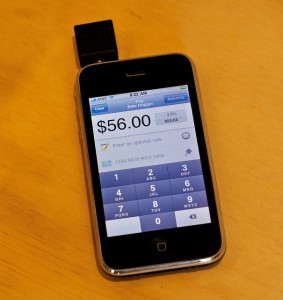 Like cars, televisions, or laptops, mobile phones and tablets are now quite common. You’re probably using one to read this post right now. Billions of people either have a mobile device or access to mobile communications.
Like cars, televisions, or laptops, mobile phones and tablets are now quite common. You’re probably using one to read this post right now. Billions of people either have a mobile device or access to mobile communications.
So, it makes sense that smart phones and tablets have the power to transform the way entrepreneurs operate. Mobile payment technology has been a boon for many small business owners. They have also provided interesting new opportunities for entrepreneurs. This should be part of your business’ mobile strategy.
Consumers have been slower to use mobile payments. For many, it’s still easier to pay with a credit card. This could change if more retailers can effectively use mobile payments to improve convenience and enhance the shopping experience. Let’s look at two distinct parts of the mobile payment arena.
Table of Contents
Registers
Merchants can accept payments using registers, or readers, attached to smart phones or tablets. These mobile registers provide flexibility and can improve cash flow. Business owners use them to collect payments immediately after providing services. This benefits a wide variety of mobile small business owners. Lawyers, locksmiths, contractors, farmers markets, hairdressers, and food truck vendors are just a few businesses that can use mobile registers to their advantage.
Point Of Sale Flexibility
Retailers may also use the same reader to streamline the POS process. For example, salespeople can be equipped with mobile readers on the floor. Then, they can quickly process payments upon making a sale, ringing up the item and issuing a receipt to the customer on the spot. This can increase sales, especially during busy times of the day, like lunch, when consumers are pressed for time. And, many will spend more when it’s easier to pay.
Wallets
Mobile wallets are different from card readers. With mobile wallet technology, consumers can download an app onto their own personal device. Then, they can use the device to pay for purchases at brick and mortar locations.
This option has been slower to catch on. This is likely due to a few different factors. For one, there is the extra cost incurred by retailers to set up the systems that accept mobile payments. And for many consumers, using a credit card is still more convenient.
But offline retailers can creatively use mobile wallets and apps to make shopping more enjoyable. Businesses and entrepreneurs can find new ways to make mobile payments via cell phone more convenient for consumers. Then they are more likely to catch on permanently.
Saving Time
Everyone hates waiting in a long line, and smart phone apps can help consumers skip this unpleasant step in the buying process. Some companies are experimenting with letting customers avoid lines if they pay using their mobile wallets. For example, Chipotle reportedly allows customers to pay with an app that lets them bypass the line for the register.
Mobile Payment Processors
Here are four of the more popular mobile payment processors. The first three offer a free card reader and app.
Square – They have a fee of 2.75% per swipe for all major credit cards. Or, you can pay a flat monthly of $275.
GoPayment by Intuit – Their free plan offers rates of 2.75% per swipe. This goes up to 3.75% for “keyed-in” transactions. Monthly plan has service fee of $12.95 per month, with a 1.75% swipe fee. 2.75% for “keyed-in” transactions.
PayPal Here – A rate of 2.70% per swipe for credit card or PayPal, with no fees. For credit card “key-in” transactions or scans, 3.50% + $0.15.
Dwolla – Dwolla is different from the others, but it’s interesting and warrants inclusion. It eliminates bank middlemen and is used only for cash transfers. The result is very low fees, just $0.25 per transaction, and it’s free for transactions of $10 or less. Cannot be used with credit cards, no card reader.
Opportunities for Entrepreneurs
Emerging and frontier markets are areas that could be especially ripe for growth in the mobile payments industry. Mobile payment technologies seem to lend themselves well to microbanking and could help spur economic growth in those areas.
So, new flexible payment technologies could help economies all over the world. Mobile registers provide flexibility and thus encourage small business owners to grow operations. Mobile payment technology can enhance and encourage creativity, entrepreneurship, and business ownership in underserved areas. Visa has seen the potential and is now expanding mobile payment operations into Africa.
Again, one of the chief reasons behind slow consumer adaptation of mobile payments is the convenience factor. Mobile wallets are not that helpful for consumers yet. It’s still easier to just pull out your credit card and swipe versus using your phone to pay.
But this presents opportunities for entrepreneurs. People like things that make their lives easier. They will readily adapt technology that saves them time. Small business owners took to mobile payments because they make things more efficient. And mobile payments will likely catch on quickly with consumers once they become easier to use than credit cards.
Have you adopted mobile payment technology for your business? What provider do you recommend?


[…] @ Entrepreneurship Life writes Mobile Payment Opportunities – Like cars, televisions, or laptops, mobile phones and tablets are now quite common. […]